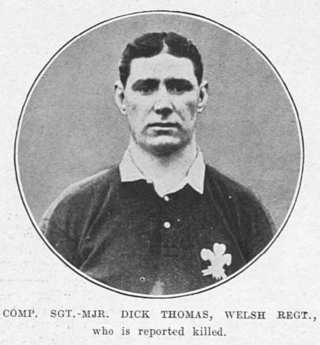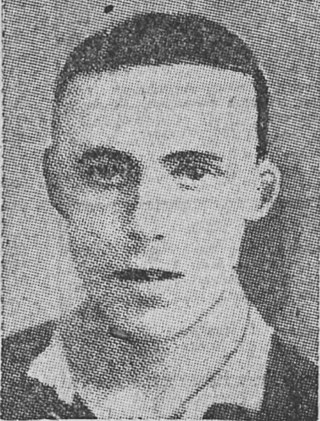
Paul Johannes Roos was one of the first South African Springbok rugby union captains and led the first South African rugby team to tour overseas – to Britain in 1906. Roos was born near the South African town of Stellenbosch on 30 October 1880 and completed his education there.
| repyears1 = | repyears2 = 1953–1961 | repyears3 = 1959 | repcaps1 = | repcaps2 = 21 | repcaps3 = 2 | reppoints1 = | reppoints2 = 50 | reppoints3 = 5 | ru_ntupdate = | coachteams1 = | coachyears1 = | ru_coachupdate = | occupation = timber-merchant | relatives = Len Davies (brother) }}
Fred Birt was a Welsh international, rugby union centre who played club rugby for Newport and county rugby with Monmouthshire. He won seven caps for Wales but is most notable for his outstanding performance against the 1912 touring South African team for Newport. He was also a member of the Wales bowls team.

William Purdon Geen was a rugby union wing and centre, who represented Wales, and played club rugby for Oxford University and Newport and county rugby for Monmouthshire. He was also invited to play for the Barbarians on several occasions. Geen unsuccessfully trialled for England in 1910, but was selected and played for Wales on three occasions in the 1912–1913 season. Injury prevented him from playing more internationals, and his service in the First World War put an end to his career.
Harry Hiams was a Welsh international forward who played club rugby for Swansea and Llanelli. He won two caps for Wales and played for Llanelli against the touring South Africans. During the First World War, Hiams served with the Royal Field Artillery.
Robert "Bobby" Lloyd was born on 1888 in Crickhowell, Wales. He was also known by the nickname of "The Hafodyrynys Wonder", was a Welsh rugby footballer who represented Wales in both rugby union and rugby league. He played union for Welsh clubs Pontypool and Monmouthshire County as a scrum half back, gaining selection for Wales, before moving to England to play league for Halifax, also in the halves, and gaining selection for Great Britain and Wales. He died on 18 January 1930 while in Halifax, England.
Walter John Martin DCM was a Wales international rugby union player. He played club rugby predominantly for Newport, captaining the side and played county rugby for Monmouthshire. While playing for Newport, Martin faced the three major Southern Hemisphere teams, Australia, South Africa and New Zealand. At international level he represented Wales on three occasions.

Edward John Richard Thomas was a Welsh international rugby union back who played club rugby for Mountain Ash.
William Davies, known more commonly as "Sgili", was a Wales international rugby union player who played club rugby for Swansea. He won four caps for Wales and was part of the Welsh side that faced the touring South Africans in 1931.
Ronald Winston Boon was an international rugby union wing for Wales who played club rugby for Cardiff. Boon possessed a tremendous self-confidence in his own ability and this was reflected in his nickname Cocky. Boon was a quick runner, representing Wales at the 220-yard sprint, and was an excellent drop kicker. He is best known in Welsh rugby as the man who scored all seven points in 1933 against England to end the 'Twickenham bogey', and along with Jack Morley is seen as one of the greatest Welsh wings since the country's first Golden Era of rugby.
Glyn Prosser was a Welsh international rugby union flanker who played club rugby for Neath, and was capped four times for Wales. An aggressive wing forward, Prosser is best known for being a member of the Wales team that beat the touring New Zealanders in 1935.

Fred Leonard Perrett was a Welsh international rugby union prop who played club rugby for Neath. He won five caps for Wales, and in his first international game faced the touring South Africans.

William Rex Willis was a Welsh international rugby union scrum-half who played club rugby for Cardiff and invitational rugby for the Barbarians. He won 21 caps for Wales and was selected to play in the British Lions on the 1950 tour of Australia and New Zealand.
Rees Thomas was a Welsh international rugby union back row player who was utilised usually as a flanker or Number 8. Thomas played club rugby for Pontypool and county rugby for Monmouthshire. He won eight caps for Wales and played between 1909 and 1913, representing Wales during two Triple Crown winning seasons.
Howell Lewis was a Welsh international rugby union wing who played club rugby for Swansea Rugby Football Club and was capped for Wales on four occasions. Lewis was also part of the Swansea team that beat the touring South Africa team in 1912.
David John Thomas was a Welsh international forward who played club rugby for Swansea Rugby Club. He won ten caps for Wales and is most notable for scoring the only try in Swansea's win over South Africa in 1912.
Glamorgan County RFC is a Welsh rugby union club that manages an invitational team, known as Glamorgan that originally played rugby at county level. The team is made up of amateur players from sports clubs in the Glamorgan region and historically played matches against other county teams from Wales and England, and during the 20th century was a key fixture for touring international teams. Today the club manages Glamorgan's premier rugby union tournament, the Glamorgan County Silver Ball Trophy, and arranges invitational Glamorgan teams to face Welsh rugby clubs during celebrations, such as anniversaries.

John Hart Evans was a Welsh international rugby union centre who played club rugby for Pontypool. He won three caps for Wales during 1907.

John "Jack" Alf Brown, colloquially known as John Alf or "Big John", was a Welsh international rugby union forward player who played club rugby for Cardiff and county rugby for Glamorgan. Brown was capped seven times for Wales and although he missed facing the first touring South African team in 1906 with Wales, he faced the tourist with both Cardiff and Glamorgan.

Joseph Henry "Jake" Blackmore was an international rugby forward who played rugby union for Abertillery and rugby league with Hull Kingston Rovers. He won a single cap for Wales under the rugby union code and then represented his country at rugby league in two matches between 1910 and 1911. Despite winning only one cap, he became a Triple Crown winning player when he played in the opening game of the 1909 Home Nations Championship.
 England 1913
England 1913 South Africa 1912
South Africa 1912






